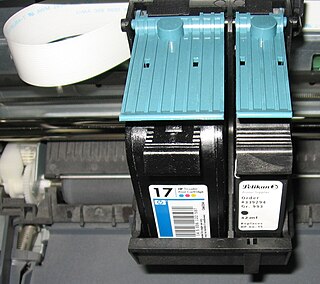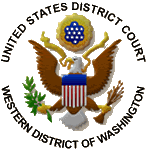An end-user license agreement is a legal contract entered into between a software developer or vendor and the user of the software, often where the software has been purchased by the user from an intermediary such as a retailer. A EULA specifies in detail the rights and restrictions which apply to the use of the software.
Bauer & Cie. v. O'Donnell, 229 U.S. 1 (1913), was a 1913 United States Supreme Court decision involving whether a purchaser of a patented product bearing a price-fixing notice incurs guilt of patent infringement by reselling the product at a price lower than that which the notice commands. A divided Court (5—4) held that it was not.
Lexmark International, Inc. is a privately held American company that manufactures laser printers and imaging products. The company is headquartered in Lexington, Kentucky. Since 2016 it has been jointly owned by a consortium of three Chinese companies: Apex Technology, PAG Asia Capital, and Legend Capital.
The exhaustion doctrine, also referred to as the first sale doctrine, is a U.S. common law patent doctrine that limits the extent to which patent holders can control an individual article of a patented product after a so-called authorized sale. Under the doctrine, once an authorized sale of a patented article occurs, the patent holder's exclusive rights to control the use and sale of that article are said to be "exhausted," and the purchaser is free to use or resell that article without further restraint from patent law. However, under the repair and reconstruction doctrine, the patent owner retains the right to exclude purchasers of the articles from making the patented invention anew, unless it is specifically authorized by the patentee to do so.

An ink cartridge or inkjet cartridge is a component of an inkjet printer that contains the ink that is deposited onto paper during printing.
Illinois Tool Works Inc. v. Independent Ink, Inc., 547 U.S. 28 (2006), was a case decided by the Supreme Court of the United States involving the application of U.S. antitrust law to "tying" arrangements of patented products. The Court ruled unanimously that there is not a presumption of market power under the Sherman Antitrust Act when the sale of a patented product is conditioned on the sale of a second product in a tying arrangement. A plaintiff alleging an antitrust violation must instead establish the defendant's market power in the patented product through evidence.
Lexmark International, Inc. v. Static Control Components, Inc., is an American legal case involving the computer printer company Lexmark, which had designed an authentication system using a microcontroller so that only authorized toner cartridges could be used. The resulting litigation has resulted in significant decisions affecting United States intellectual property and trademark law.

Mallinckrodt, Inc. v. Medipart, Inc., 976 F.2d 700, is a decision of the United States Court of Appeals for the Federal Circuit, in which the court appeared to overrule or drastically limit many years of U.S. Supreme Court precedent affirming the patent exhaustion doctrine, for example in Bauer & Cie. v. O'Donnell.
Quanta Computer, Inc. v. LG Electronics, Inc., 553 U.S. 617 (2008), is a decision of the United States Supreme Court in which the Court reaffirmed the validity of the patent exhaustion doctrine, and in doing so made uncertain the continuing precedential value of a line of decisions in the Federal Circuit that had sought to limit Supreme Court exhaustion doctrine decisions to their facts and to require a so-called "rule of reason" analysis of all post-sale restrictions other than tie-ins and price fixes. In the course of restating the patent exhaustion doctrine, the Court held that the exhaustion doctrine is triggered by, among other things, an authorized sale of a component when the only reasonable and intended use of the component is to practice the patent and the component substantially embodies the patented invention by embodying its essential features. The Court also overturned, in passing, the part of decision below that held that the exhaustion doctrine was limited to product claims and did not apply to method claims.
Jazz Photo Corp. v. United States International Trade Commission, 264 F.3d 1094, was a case in which the United States Court of Appeals for the Federal Circuit clarified the law of repair and reconstruction, holding that it was not a patent infringement for one party to restore another party's patented "one-use" camera to be used a second time.

Vernor v. Autodesk, Inc. was a case in the United States District Court for the Western District of Washington regarding the applicability of the first-sale doctrine to software sold under the terms of so-called "shrinkwrap licensing." The court held that when the transfer of software to the purchaser materially resembled a sale it was, in fact, a "sale with restrictions on use" giving rise to a right to resell the copy under the first-sale doctrine. As such, Autodesk could not pursue an action for copyright infringement against Vernor, who sought to resell used versions of its software on eBay. The decision was appealed to the United States Court of Appeals for the Ninth Circuit, which issued a decision on September 10, 2010, reversing the first-sale doctrine ruling and remanding for further proceedings on the misuse of copyright claim. The Ninth Circuit's decision asserted that its ruling was compelled by Ninth Circuit precedent, but observed that the policy considerations involved in the case might affect motion pictures and libraries as well as sales of used software.

A toner cartridge, also called laser toner, is the consumable component of a laser printer. Toner cartridges contain toner powder, a fine, dry mixture of plastic particles, carbon, and black or other coloring agents that make the actual image on the paper. The toner is transferred to paper via an electrostatically charged drum unit, and fused onto the paper by heated rollers during the printing process. It will not stain like ink cartridges, but it can get messy if handled improperly.
Fujifilm Corp v. Benun, 605 F.3d 1366 was a case in which the United States Court of Appeals for the Federal Circuit affirmed the judgment made by the United States District Court for the District of New Jersey that the defendants infringed patents owned by Fujifilm Corporation.
Kirtsaeng v. John Wiley & Sons, Inc., 568 U.S. 519 (2013), is a United States Supreme Court copyright decision in which the Court held, 6–3, that the first-sale doctrine applies to copies of copyrighted works lawfully made abroad.
Bowman v. Monsanto Co., 569 U.S. 278 (2013), was a United States Supreme Court patent decision in which the Court unanimously affirmed the decision of the Federal Circuit that the patent exhaustion doctrine does not permit a farmer to plant and grow saved, patented seeds without the patent owner's permission. The case arose after Vernon Hugh Bowman, an Indiana farmer, bought transgenic soybean crop seeds from a local grain elevator for his second crop of the season. Monsanto originally sold the seed from which these soybeans were grown to farmers under a limited use license that prohibited the farmer-buyer from using the seeds for more than a single season or from saving any seed produced from the crop for replanting. The farmers sold their soybean crops to the local grain elevator, from which Bowman then bought them. After Bowman replanted the crop seeds for his second harvest, Monsanto filed a lawsuit claiming that he infringed on their patents by replanting soybeans without a license. In response, Bowman argued that Monsanto's claims were barred under the doctrine of patent exhaustion, because all future generations of soybeans were embodied in the first generation that was originally sold.
Henry v. A.B. Dick Co., 224 U.S. 1 (1912), was a 1912 decision of the United States Supreme Court that upheld patent licensing restrictions such as tie-ins on the basis of the so-called inherency doctrine—the theory that it was the inherent right of a patent owner, because he could lawfully refuse to license his patent at all, to exercise the "lesser" right to license it on any terms and conditions he chose. In 1917, the Supreme Court overruled the A.B. Dick case in Motion Picture Patents Co. v. Universal Film Mfg. Co.,
Impression Products, Inc. v. Lexmark International, Inc., 581 U.S. ___ (2017), is a decision of the Supreme Court of the United States on the exhaustion doctrine in patent law in which the Court held that after the sale of a patented item, the patent holder cannot sue for patent infringement relating to further use of that item, even when in violation of a contract with a customer or imported from outside the United States. The case concerned a patent infringement lawsuit brought by Lexmark against Impression Products, Inc., which bought used ink cartridges, refilled them, replaced a microchip on the cartridge to circumvent a digital rights management scheme, and then resold them. Lexmark argued that as they own several patents related to the ink cartridges, Impression Products was violating their patent rights. The U.S. Supreme Court, reversing a 2016 decision of the Federal Circuit, held that the exhaustion doctrine prevented Lexmark's patent infringement lawsuit, although Lexmark could enforce restrictions on use or resale of its contracts with direct purchasers under regular contract law. Besides printer and ink manufacturers, the decision of the case could affect the markets of high tech consumer goods and prescription drugs.




